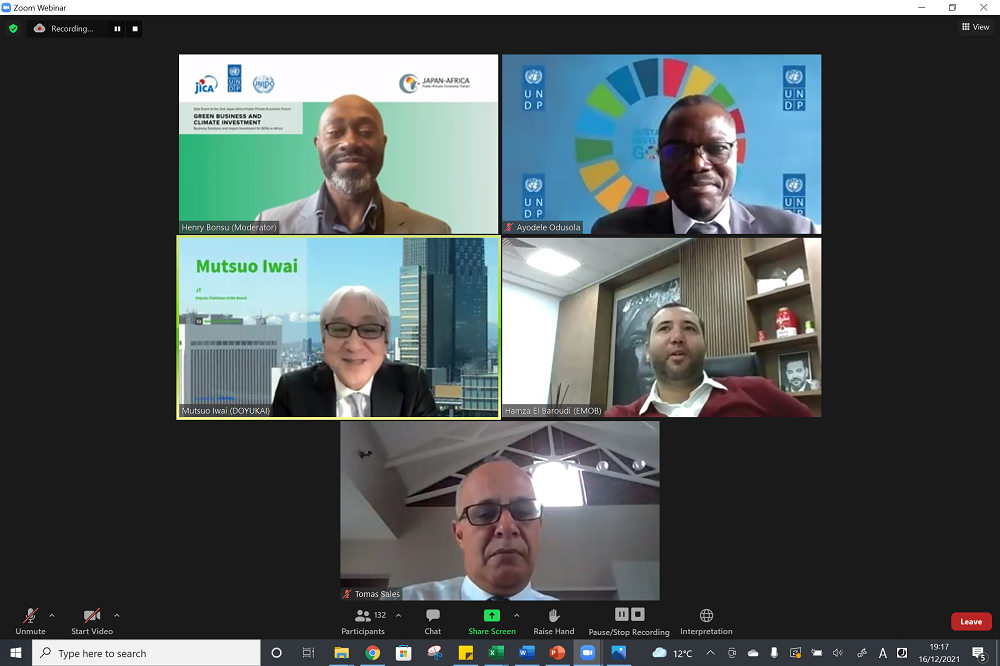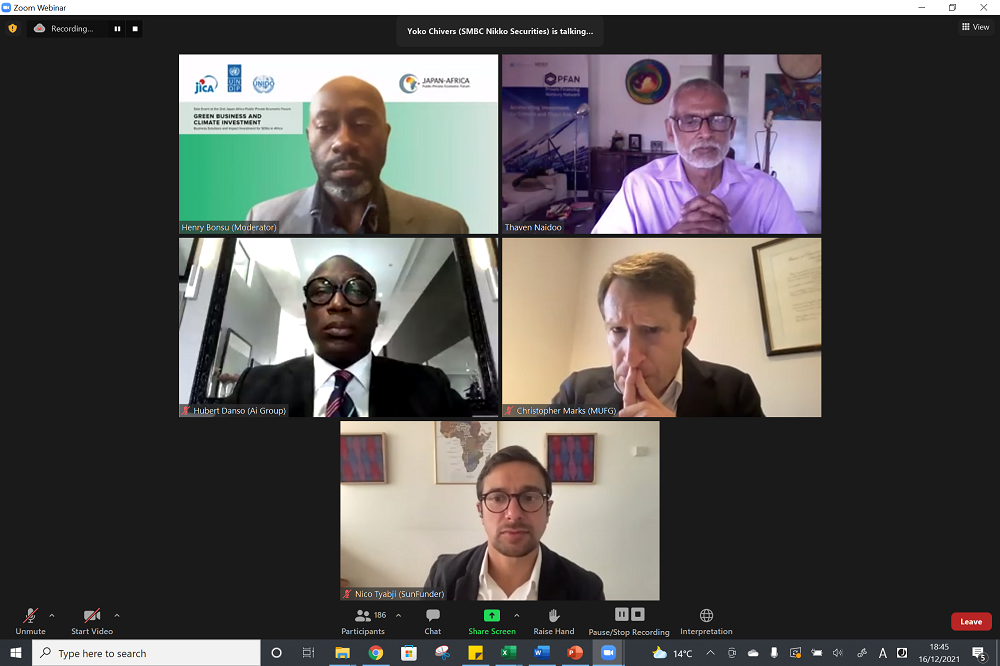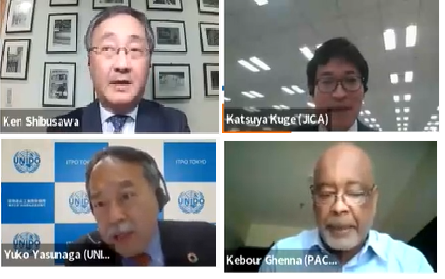Green Business and Climate Investment: Business Solutions and Impact Investment for SDGs in Africa
January 17, 2022
With Africa on the frontline of the world’s climate emergency and ecological crisis, the need for increased commitment and investment towards green transition is now more important than ever.
Within the context of sustainable recovery from COVID-19, a side-event co-organised by Japan International Cooperation Agency (JICA), United Nations Development Programme (UNDP), and the United Nations Industrial Development Organization (UNIDO) at the 2nd Japan Africa Public Private Economic Forum brought together business leaders and industrial players to discuss and showcase climate resilient and nature-based solutions. The session aligned with the pillars of the growth strategy of the Government of Japan and follows the global commitment made at the 26th Conference of the Parties (COP26) in November 2021.
While Africa’s carbon footprint is minimal, the effects of global climate change is most visible on the continent. “The world is at a turning point to restore climate balance with nature. This, however, will require a concerted effort. The world must design, develop and deliver Sustainable Development Goals aligned with business and investment strategies toward reducing social impact and supporting a fair transition,” stressed Dr. Ayodele Odusola, Director, Africa Finance Sector Hub and UNDP Resident Representative in South Africa. This includes, among other interventions, such as shifting from fossil fuels to renewable energy sources such as solar, hydro and wind power, improving farming practices, and restoring and safeguarding oceans and forests.
According to Mr. Ken Shibusawa, CEO of Shibusawa and Company Inc., greater business investment in Africa was important in securing a future with inclusive societies and long-term sustainable development. “We need to increase our investments in Africa for the future of Africa and Japan. And we need to do this with impact. Here in Japan, we have large corporations, SMEs and start-ups that can participate in that new value creation in Africa and all over the world.”
In April 2021, the President of the African Development Bank highlighted energy, agriculture and infrastructure as key areas of investment potential for a post-COVID-19 recovery in Africa. With abundant solar, wind, hydro and geothermal energy resources, Africa’s energy transition alone presents $100 billion per year investment opportunity and climate-resilient infrastructure offers investment potential of between $130 billion and $170 billion.
As Africa, Japan and the world prepare for the upcoming TICAD8 in Tunisia in 2022, Dr. Katsuya Kuge, Senior Director, Energy and Mining Group, JICA, reinforced Japan’s business investment commitment for energy transition towards green growth in Africa. “JICA will continue to promote green energy development from three directions: stable supply, energy access, and business. It’s important that private and public sectors work together to realise these objectives.”
How to invest in Green Business in Africa
To support Africa’s need for interventions that align with the SDGs and help reduce the impact of climate change while creating jobs, five panellists presented their green business models. These ranged from turbine and solar energy generation to e- mobility, climate resilient building, and finance support.
Mr. Shigeto Mizumoto, Chief Strategy Officer for Challenergy Inc, which designs and promotes innovative wind-energy solutions across the world, highlighted that more than 1.3 billion people live without access to electricity, especially in developing countries. “To overcome these challenges without depending on fossil or nuclear energy, I think it is essential to develop innovative wind turbine, which can enhance the energy shift,” he explained. However, in areas where wind turbines help the move away from fossil fuels, the turbines are often destroyed by severe weather patterns, particularly in areas where tropical storms (typhoons, hurricanes, cyclones) strike frequently and areas where strong winds blow near the polar regions. Challenergy Inc. has developed a turbine that is able to withstand winds up to 340km/h and has a lifespan of up to 20 years.
Mr. Nobuhiro Kawaguchi, Executive Director of GOOD ON ROOFS noted that the idea behind the business is to promote innovative solar energy solutions and sustainable financial and business models in Japan and Africa. The company has created lightweight solar panels that make for easier transportation and installation while generating maximum power and their panels currently supply about 30 MW of power. “Infrastructure like power grids is being developed in cities, but development is lagged behind in rural areas. This creates disparities and can lead to discrimination and conflict. If solar power is available at schools in rural area, the power can be used for lighting and communication and even for remote learning at some day,” Mr. Kawaguchi explained. Their solar panels installed on the school roofs in Benin will not only provide lighting for students at schools but also enable the project of 400,000 rechargeable lantern that can be taken home and help 200,000 children study at home even at night.
Given that Africa’s built environment is expected to double by 2050 due to high population growth and urbanization, Mr. Shaninomi Eribo, the Founder/ CEO GreenSquareMetre, highlighted the need for a transition to ‘low carbon/green’ buildings in sub-Saharan Africa (SSA). Referencing the IFC’s Climate Investment Opportunities Report, he underscored in his presentation that there was a $768BN investment opportunity in green buildings in SSA up to 2030 with Nigeria’s housing deficit of 17 million units also presenting an investment opportunity of over $500BN. As a company at the forefront of efforts to mainstream the practice of green buildings in Nigeria and SSA, he called for partnerships around alternative finance, as well as green building technologies and appliances to fully enable the transition.
Regarding carbon emissions, Mr. Hamza El Baroudi, co-founder of EMOB from Morocco was confident that electric scooters are the way forward for reduced carbon emissions in African cities. In Morocco, where there are estimated 1.5 million fuel-powered scooters in circulation, the mode of transport is responsible for significant pollution. The local e-mobility eco-system has grown through partnering with the local government authority and international partner, Allianz, enabling access to electric scooters easier with financial assistance. “With our electric scooters, we want to pave the way for a greener Morocco by building a powerfully integrated, agile, and fast ecosystem through local and international partnerships.” The company aims to expand the eco-system across the continent.
As business investments in Africa grow, it becomes increasingly vital to protect the environment and natural resources. “The majority of financial returns are still largely dependent on unsustainable consumption of natural resources and most investments and financial products lack the integration of environmental impacts,” noted Ms. Alice Ruhweza, the Africa Regional Director of World Wide Fund for Nature (WWF). By demonstrating the value of nature and the links between financial and environmental risks, WWF and its partners aim to redirect the flow of finance away from activities that harm our planet toward those that restore it. In Zambia, for example, WWF interventions are driving landscape-based, green bankable investments through the Dutch Fund for Climate and Development. Eligible projects have to be private sector-led and have to help save degrading landscapes. Essentially, green funds will flow to projects in Zambia that deliver the commercial, social and environmental returns.
As existing and new industries in Africa expand and develop, they must make use of today's technological capabilities for cleaner industrial production, according to Dr. Yuko Yasunaga, head of UNIDO Investment and Technology Promotion Office (ITPO) in Tokyo. He further explained how UNIDO’s Sustainable Technology Promotion Platform (STePP) is designed to share information on Japanese technologies that contribute to sustainable industrialization, in order to promote the transfer of such technologies to developing and emerging countries in areas of energy, environment, agribusiness and human health.
Speaking on existing global and regional climate investment and finance initiatives and instruments, as well as gaps and opportunities, Ms. Yoko Chivers, Head of Sustainable Finance Department, Capital Markets of SMBC Nikko Securities, shared the variety of Sustainable bonds (Green/Social/ Sustainable Bonds & Sustainability-linked bonds), and the benefits of the issuance. It has led to more granular discussions around each issuer’s sustainability ambitions. This was an indication that investors were morally grounded in their commitment to long-term development in Africa.
Emphasizing the importance of considering climate and environmental factors in all official development assistance spend, including in social sectors not traditionally associated with climate and the environment, Dr. Christopher Marks, Head of Emerging Markets EMEA and Managing Director at MUFG Bank, noted the need for scaling up the scope of blended finance in Africa. He equally advocated for Japan’s leadership in innovation, including investing equity into African regional development finance partners to facilitate greater engagement by private finance actors in wide-ranging sectors including the Adaptation and climate resilience sectors.
Scaling up clean energy and climate investments in undeserved markets can result in transformational impact in Africa explained Mr. Nico Tyabji, Head of Strategic Partnerships of SunFunder, which has built the most extensive track record of originating and closing solar debt transactions in Africa, having financed 60 solar companies. All of SunFunder’s investments are in developing and emerging economies, and they have designed and closed $142m of blended finance from institutional, impact and individual investors.
Mr. Hubert Danso, the Chairman of Africa investor Group, highlighted that green co-investment partnerships between African and Japanese pension funds, such as the African Green Infrastructure Investment Bank (www.AfGIIB.com), are critical for shared economic prosperity between Africa and Japan, and must be central to the TICAD 8 investor mobilisation and private sector development process.
Mr. Thaven Naidoo, Regional Coordinator of the Private Finance Advisory Network (PFAN), a global network of climate and clean energy financing experts, explained that it offers free business coaching and investment facilitation to entrepreneurs developing climate and clean energy projects in emerging markets. Supported by an extensive network of investment and network partners, PFAN mobilizes financing to reduce GHG emissions and contributes to the Paris Agreement and Sustainable Development Goals 7 (Energy), 9 (Industry), 13 (Climate Action), and 17 (Partnership). To date, the organization has supported nearly 1000 projects with more than 300 projects in the current pipeline.
In his closing remarks, Mr. Kebour Ghenna, Executive Director of the Pan African Chamber of Commerce and Industry, noted that Africa’s ecological footprint is still relatively small compared to other parts of the world, but this is increasingly changing as investment interest grows. “It is therefore important to ensure that growth is of quality and also sustainable and benefits Africa’s current and future generations.” He stressed that what is needed to mainstream green growth is a rethinking economic growth and systematic change of the status-quo to develop a new and more comprehensive architecture for economic development of the time.
Mr. Mutsuo Iwai, Chairman, Africa Project Team of the Japan Association of Corporate Executives (KEIZAI DOYUKAI), emphasized the huge potential of co-creation between Africa and Japan that there is a great opportunity for Japan to support solving to African social issues through business and investment. He addressed the importance of public-private partnerships. “I believe that green business and climate investment in Africa should consider the social impact as well as economic returns. KEIZAI DOYUKAI has advocated the establishment of a new Public-Private Impact Fund to accelerate Japanese investment in Africa and re-vitalize Japan with Africa. I hope this event promotes the closer collaboration with you all today because the participation of both sectors is inevitable to boost Japanese investment.” He concluded by expressing his hope that TICAD 8 in Tunisia in 2022 will accelerate sustainable economic growth in Africa with Japan.
Wrapping up the session, Dr. Ayodele Odusola, Director, Africa Finance Sector Hub and South Africa Resident Representative for UNDP, summarized the various perspectives presented during the session confirmed that the private sector has a key role to play in addressing the growing challenges to climate change while, at the same time, meeting the needs of the SDGs and growth recovery post-COVID 19. UNDP’s Private Sector Development and Partnership Strategy (2018-2022) aims to assist countries to align private sector activities and investments with the 2030 Agenda by: influencing investors and businesses of all sizes; embedding the SDGs into their decision making and practices; and supporting governments to establish enabling policy and regulatory environments while facilitating multi-stakeholder partnerships.

 Locations
Locations



